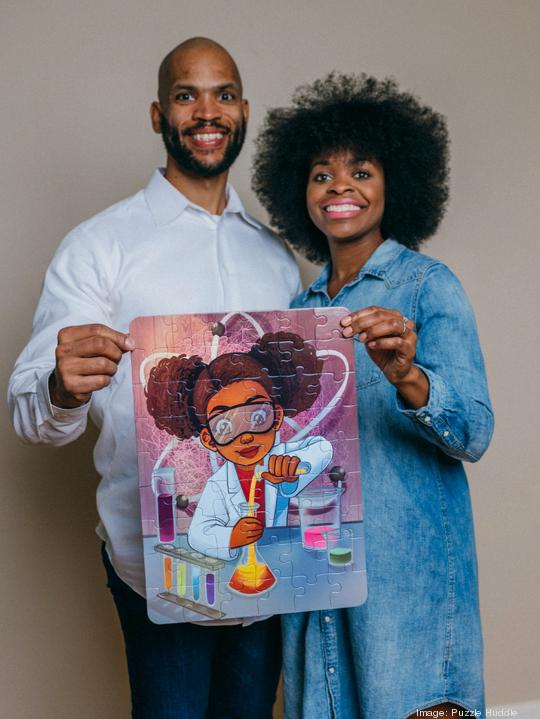
For Matthew Goins, the pieces are snapping into place.
The D.C. father had bought his three young kids coloring books, Play-Doh, blocks and dozens of puzzles depicting farm animals, dinosaurs and princesses.
“But it didn’t take me long before I realized, ‘Gosh, none of them had African American characters,’” he said. “It was painful: there was no Black princess, there was no Black pilot, there was no little Black firefighter.”
Goins printed internet stock art, glued it to cardboard and cut a puzzle of a ballerina. After making about 20, his friends started requesting them. So he found a printer, put up a website and got to work.
About three years later, the HR professional-turned-entrepreneur has transformed that project into Puzzle Huddle, a family business he’s running full-time with his wife, Marnel, interim dean in Marymount University’s School of Design, Arts and Humanities. The company is now seeing rapid growth amid the pandemic, the resurgence of the Black Lives Matter movement in the wake of George Floyd’s killing, and its own expansion into new product lines.
Puzzle Huddle was already doubling the previous year’s revenue, and now experiencing a roughly 60% spike in sales on top of that, Goins said. That began in March when parents bought activities for their kids home from school. Then the refocus on supporting Black-owned businesses “provided another unexpected focus on our company and increase in sales,” he said. That’s after the company raked in $250,000 in revenue for 2019.
The jigsaw puzzles themselves range in size from 15 to 100 pieces, for children ages 3 to 8. The images, created by freelance artists, showcase diverse characters in career roles — “future scientist,” “news professional,” “space explorer” — as well as culture, religion and education illustrations. They sell primarily through the Puzzle Huddle website for about $12 to $20. The company also had a small retail profile pre-Covid, in Nubian Hueman’s Anacostia store and some small book shops across the country.
The owners, both Howard University alums, have invested $30,000 into the business and plan to continue self-funding for now. That’s gone to marketing and advertising on Instagram, Facebook, LinkedIn and YouTube. The Puzzle Huddle founders have used those social media channels to build a following and develop the brand’s relationship with parents, aunts and “friends of the mother,” Goins said — those who are most likely to buy household toys. The key has been connecting with those customers and creating product recognition, he said, because “we don’t have a really hard time selling them; where there’s awareness, most generally we can get a sale.”
“We post a lot about Black professionals and education and childhood activities,” Goins said. “Creating an information channel that was relevant for that group, I think, has helped us build our audience base.”
For now, Goins and his wife handle everything: social media, online sales, packing and shipping. “It’s a system that will break,” he said.
So this year, the company plans to bring on employees for packing, shipping and fulfillment around Christmas, its busiest time of year. It will also need “an alternative plan, very soon” for warehousing; right now, its storage facilities are the Goins’ home kitchen, living room, dining room and basement — which its products will soon outgrow.
Inventory is increasing, too, as Goins sets out to make Puzzle Huddle more than a puzzle business. Rather, he’s building a childhood activity and education company, he said, now rolling out pillows and T-shirts with plans to add educational products down the line.
“If I can take up space on a child’s bed with a compelling image, that image hopefully will support that child’s imagination for a long time in a very close way,” he said.
His kids — now ages 3, 5 and 7 — also make for an excellent test market. “The energy I saw in response to that package opening taught me everything that I needed to know about the pillows as a viable product; the pillow fight and the insistence that the pillows go directly in their beds,” he said.
Editor’s Note: This story first appeared in the Washington Business Journal. See the original post here.